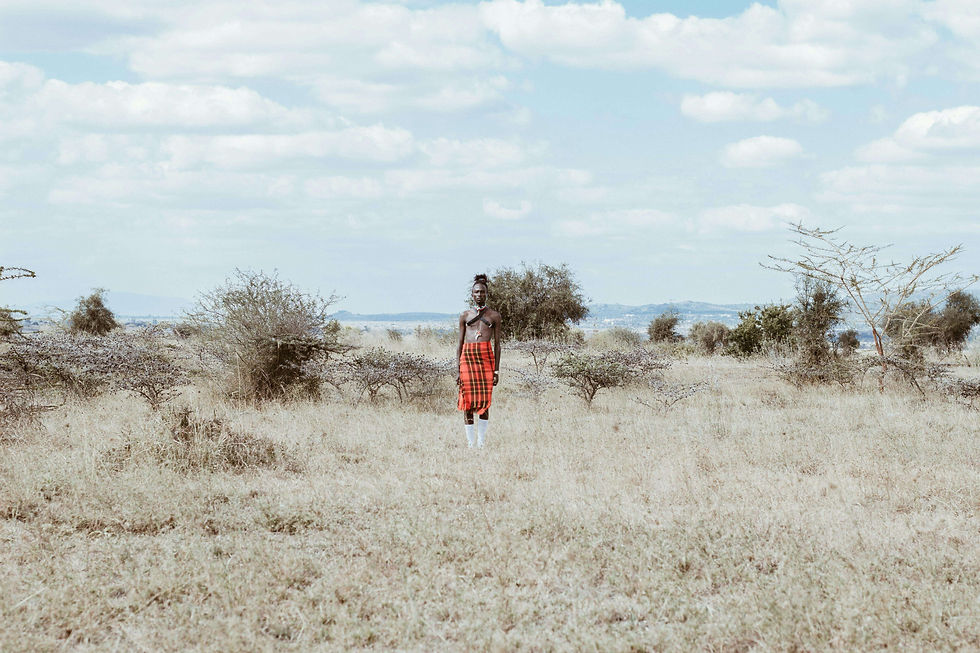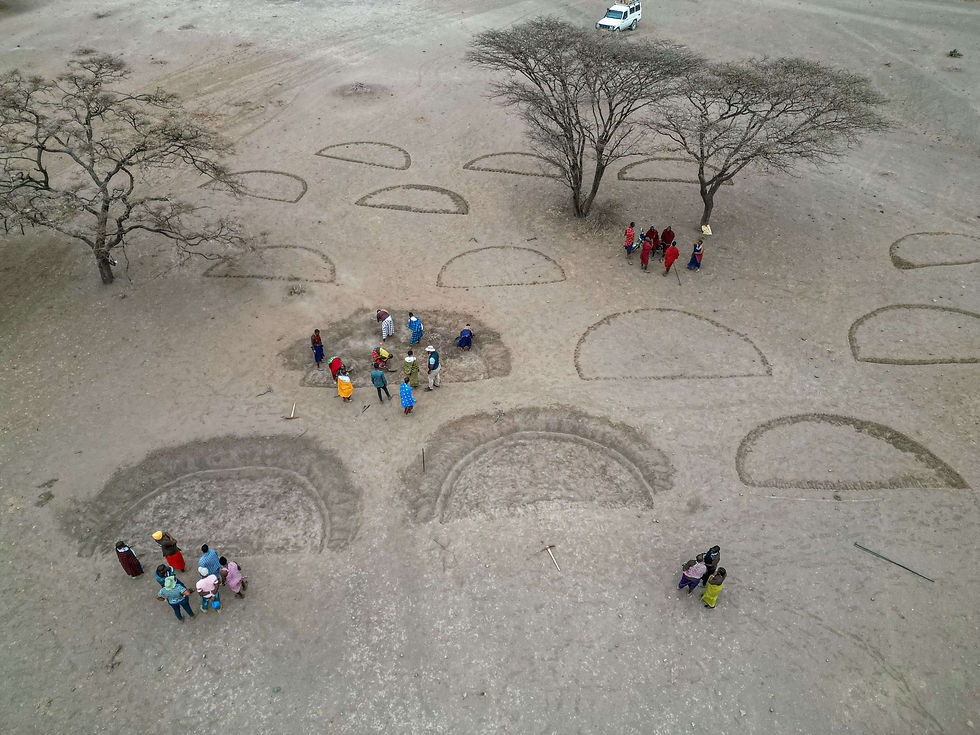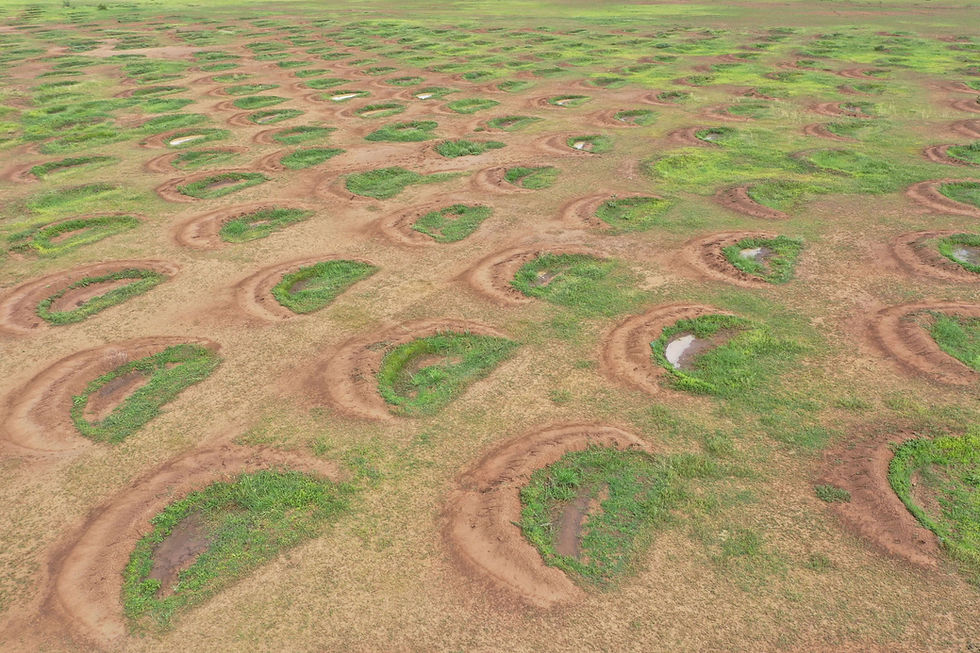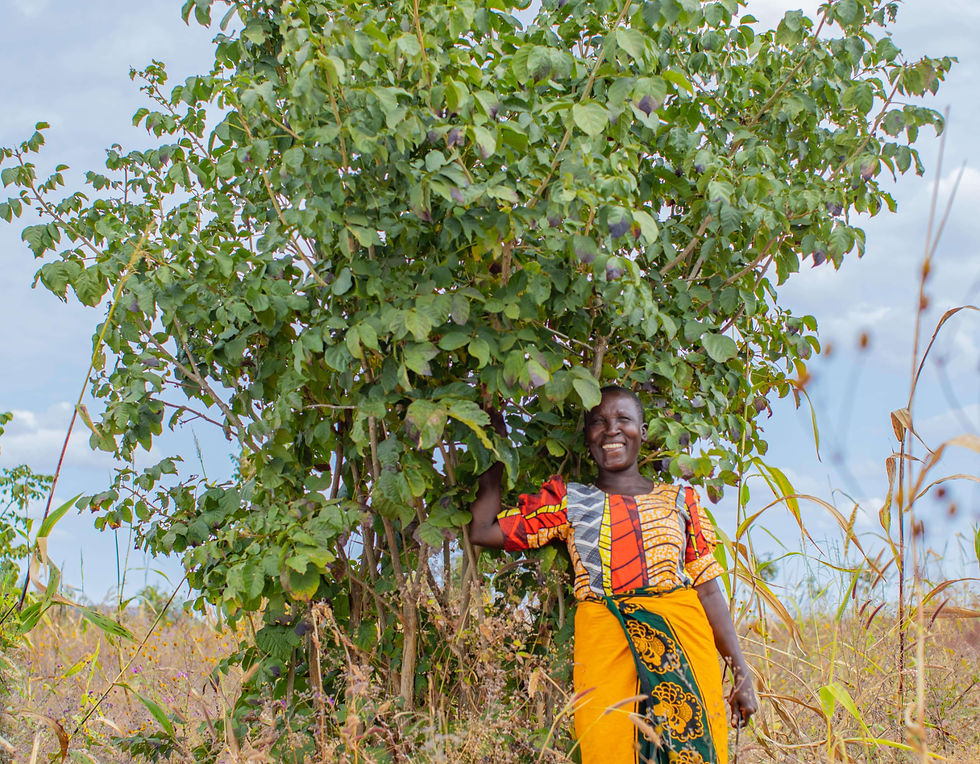How 'Justdiggit' Regreens Sub-Saharan Farmland
- Aug 19, 2025
- 7 min read
Cooling the African Continent with Nature-Based Solutions
The land is everything to the Maasai people. These seminomadic pastoralists have called Kenya home for centuries, drawing their food, shelter, culture, and livelihood from their largely dry land—80% of Kenya is designated as arid or semi-arid.
Today, some parts of the nation are in need of rejuvenation, as the lands have become degraded through environmental changes and human activity.
In fact, the land is now so dry that when the rain falls, it washes away fertile topsoil instead of replenishing it. Both the dry and wet seasons have become sources of disruption—with intense droughts and then flooding, according to the World Bank and the Climate Reality Project—and the people struggle to predict the weather because the seasons are more erratic.
Trees are few and far between, and the cattle and goats the Maasai rely on for food and income are having to roam farther to find grassland.
“When I was growing up, it was very different from what we are experiencing now—like we have the prolonged drought seasons. There [used to be] a lot of trees, a lot of vegetation. There was a lot of milk [and] healthy cattle compared to now,” Lanoi Meitekini, a livelihood coordinator for the Maasai Wilderness Conservation Trust, said in a 2017 documentary called Rainmakers II: Seeds of Change.
About a decade ago, a Dutch nonprofit named Justdiggit began engaging people in Kenya to “regreen” their lands. Their progress is now visible.

Justdiggit struck a partnership with the Maasai Wilderness Conservation Trust and one of the local Maasai tribes in southern Kenya, the Kuku Group Ranch, to help deploy proven land management methods to revive the area.

The organization, which works in many sub-Saharan nations, advises interested communities on strategies and then steps back to allow the people living there to choose what path to take and how much time and effort they want to invest in each project.
In the case of the Kuku Group Ranch, the partnership has already restored nearly 13,000 acres of land (5,200 hectares).
In the case of the Kuku Group Ranch, the partnership has already restored nearly 13,000 acres of land (5,200 hectares), retaining over 475.5 million gallons (1.8 billion liters) of water, and providing an economic opportunity for 252 Maasai women.
“What I love about [this work] is it’s positive. … It’s a lot of positive stories, which in the age of climate anxiety is very refreshing to see,” Rebecca Blinston-Jones, head of Justdiggit’s UK PR and marketing team, told The Earth & I.
Roots and Roadmap
According to the UN, land degradation is a huge issue worldwide, with Earth losing about 30 million acres (12 million hectares) of fertile land every year. This creates a destructive feedback loop: The more the land dries out, the hotter the global climate becomes, causing more degradation.
That being said, scientists have determined that about 5 billion acres (2 billion hectares) of degraded land can be restored, and a huge chunk of that viable space is in Africa.
Australian Peter Westerveld and Dennis Karpes of the Netherlands developed Justdiggit (originally called the NAGA Foundation) in 2009 after visiting different parts of Africa and seeing potential in the dry landscapes for developing hydrologic corridors, or large-scale restoration projects that trap rainwater, encourage vegetation growth, and prevent erosion.
Relying on research and personal experience, Westerveld, Karpes, and their team created a menu of methods to achieve their goals—methods that have been deployed in nine regions within Kenya, Tanzania, and Senegal. Here are examples they suggest to local communities:

“Earth smiles”: Conventionally known as water bunds, these semicircular pits are dug into a slope to optimize rainwater capture and allow local vegetation to grow. Resembling a smile, they typically measure about 8.2 feet by 16.4 feet (about 2.5 meters long and 5 meters wide). Westerveld introduced this regenerative method from Australia where “bunding” is a common practice. It only takes about six months to see impressive results from digging these formations. Justdiggit recommends that local communities dig anywhere from 18,000 to 36,000 earth smiles to fully restore their land. Thus far, the Kuku Group Ranch has dug more than 490,000 water bunds on their land to replenish the soil.
Conventionally known as water bunds, these semicircular pits are dug into a slope to optimize rainwater capture and allow local vegetation to grow.

“Treecovery”: Locally known in Africa as Kisiki Hai (which means tree stump in Swahili) and conventionally known as Farmer Management Natural Regeneration (FMNR), this forgotten native agroforestry technique was formally developed by Justdiggit’s partner, NGO World Vision, in the 1980s. “For Western audiences, we call this ‘treecovery’ because it has a nice ring to it,” Blinston-Jones said.
This method involves selecting tree stumps the community wants to protect, prioritizing the best shoots (growing from the trunks) to propagate, marking the tree so others know not to disturb it, and nurturing the tree back to maturity. It’s an effective method compared to planting new trees because these trees have already developed root systems to survive in certain climates. Increasing tree canopy in this way cools the local environment, provides decaying leaves to nourish the topsoil, and promotes biodiversity. Justdiggit works with the LEAD Foundation in Tanzania to promote treecovery, and locals can see a difference in just one year.

Grass seed banks: Promoting the growth of indigenous grasses provides food for livestock, promotes biodiversity and water absorption, and develops income for Maasai women in particular. It’s a relatively simple concept: Promote grassland growth by fencing off an area, sell the hay to local farmers during the dry season, collect the seeds to sell at local markets, and choose when to open up the land to let livestock graze.
Right now, Maasai women sell the seeds back to Justdiggit to plant in other locations, but the organization is working with local partners to determine the proper procedures for the women to sell seeds in the open market. So far, the Kuku Group Ranch has developed 13 grass seed banks. Because these banks are tended by the women of the community, this method improves women’s social status within their communities and empowers them to provide for their families, which can result in upward mobility. For example, the money can be used to buy schoolbooks for children.
Separately, the Save the Elephants organization urges the owners of grass seed banks to surround them with beehives to ward off elephants from munching on the vegetation. As it turns out, elephants are scared of bees. And the Maasai women score a second form of income: honey!
Other techniques: The methods above are just some of the options offered by Justdiggit to the communities they work with. Others include grazing management techniques to minimize overgrazing and building stone creeks to promote rainwater absorption and reduce erosion.
Getting the Word Out
Justdiggit, which reported $7.5 million (Euro 6.5 million) in income in 2024, advertises through local African media and influencers to reach interested communities. The organization also does “movie roadshows” where they travel to different communities to show videos on the benefits of regreening methods. If a community shows interest, Justdiggit’s experts listen to the community’s main concerns before providing a list of options customized for the region’s particular conditions. Justdiggit will then help develop pilot projects to show the community what to do and why, with the goal of community members taking ownership of the work. Justdiggit emphasizes community agency and encourages locals to reinvigorate traditional farming methods like Kisiki Hai.
“When the Justdiggit team came, mixing the science and the local knowledge, it was very easy to say, ‘Let’s give it a try!’”
“When the Justdiggit team came, mixing the science and the local knowledge, it was very easy to say, ‘Let’s give it a try!’” Benson Leyian, general manager of the Amboseli Ecosystem Trust, said in Justdiggit’s 2017 documentary.
A Decade of Doing
Justdiggit considers this decade “the decade of doing,” creating the ambitious goal of working with 350 million farmers and pastoralists by 2030 to regreen sub-Saharan Africa. According to their 2024 impact report, they have so far recruited 2,200 farmers to take up restoration efforts. Through this, the organization’s regreening projects have restored almost 1.2 million acres (478,000 hectares) of land in sub-Saharan Africa, which is enough land to cover New York City five times over. They reached this goal by adding 60 new villages from Senegal and Tanzania to their program, bringing their total to 636 villages or more than 190,000 households.
Since the start of the project, Justdiggit has helped African communities develop 36 grass seed banks, empowering 770 female entrepreneurs. The organization says none of this could have been done without the help of their large group of partners and donors in Africa and Europe. For example, groups like Seqanna have helped provide satellite data so Justdiggit can monitor project progress throughout the year.
This is only one of the emerging technologies that Justdiggit is engaged in. To work with so many farmers at once, Justdiggit deployed the Kijani app. This app provides information to farmers, via their smartphones, on how to deploy different nature-based solutions like the ones mentioned previously. The app is currently available in English and Swahili, but Justdiggit is working on making it soon available in French. Additionally, Justdiggit is working on developing AI people who can communicate farming methods on the app in whatever language needed. AI provides the opportunity to add new languages without having to rerecord scripts each time.
Justdiggit is also utilizing virtual reality on their website to allow donors and funders to see real-time progress without having to physically go to Africa. This is part of their effort to increase donations from Europe to multiply their projects. One way individuals can get involved is by purchasing earth smiles to help support on-the-ground efforts.
“I see the results that would not have been possible without the Justdiggit intervention,” Benson said in the 2017 documentary, “and I am always excited because I know that if you see people copying an idea, that is an idea that is worth spreading across the country.”

*Becky Hoag is a freelance environmental reporter. You can find her work on her site beckyhoag.com and through her YouTube channel https://youtube.com/beckisphere



Comments